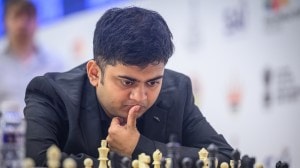For them, peace also means Dad coming home
ARAMPORA (SOPORE), AUGUST 6: I was in Class IV when I saw him last here. I had forgotten his face till I saw his picture in the newspape...

ARAMPORA (SOPORE), AUGUST 6: “I was in Class IV when I saw him last here. I had forgotten his face till I saw his picture in the newspaper recently. The Army had even snatched all his pictures during hundreds of raids made on our house,” she said.
She is 17 years old. She is Rehana Majeed, the daughter of Majeed Dar, the man who announced Hizbul Mujahideen’s ceasefire-dialogue offer.
For Dar’s daughters, Mehmooda Majeed (23) and Rehana, the dialogue move has kindled hopes that their father will be back among them after a 11-year separation. “We long to see him amidst us. We dream of him returning home every evening like fathers of our friends,” Rehana said.
Mehmooda recollects meeting her father in 1992, just days before he leftfor Pakistan. “All of us were taken secretly to one of his hideouts. Wemet him and spoke to him for two hours. He did not tell us that he was toleave for so long. He advised us to study well and take care of our grandmother. I was in Class X then, it is a long long time,” she said. Rehana had bad luck. “I could not meet him even then. I had gone to visitmy maternal grandparents at Baramullah,” she said.
Both of them are optimistic. “Talks are good. We know what it means to haveraids and harrasment everyday. Those who are active in the field (militancy), their families want some sort of a break,” she said andemphasised “but not at the cost of the cause”.
A relative and neighbour, Shamas-ud-din (60), sitting in the room, burstedout. “There is a lot of suspicion about the whole dialogue process. It isnothing surprising because whosoever talks to India will have to bear withit,” he said. “India has created an impression internationally thatKashmiris were not ready to leave gun and come to the table. Dar wanted to put an end to it. If India enters into an unconditional and meaningful dialogue with Hizbul Mujahideen, it will bring not only an end to the bloodshed here but also help to resolve the problem once for all. And if the talks failed, it will expose India”.
Dar’s villagers believe that ceasefire has no meaning and talks are a ploy. But they want to give Dar and his peace proposal a chance. For, they know his convictions and what he stands for.
Dar’s elder brother Mohamad Maqbool Dar has no doubts. “He will neversurrender. He will prefer death to a sell-out,” he said and added that hisbrother wanted a “dialogue to give tehreek (movement) a direction and show to the outside world that we are not averse to leave guns and talk ifmeanigful.”
For many mothers and sisters in the village, who have their sons andbrothers still holding the gun as active militants, Dar’s ceasefiredialogue generated hope that they would one day return to their arms.The village had already buried 200 killed in the decade-longviolence.
However, just a few dozen yards away, a young man Ghulam Nabi Seroo callsthe ceasefire and talks offer of the Hizbul Mujahideen “bull****”.Sheroo, who’s brother Mushtaq Ahmad Sheroo and cousin Ajaz Ahmad Sheroowere killed by the Army recently, said: “Until the Government ofIndia changes its atoot ang‘ (integral part) rhetoric, there is no meaning to any dialogue”.
He added: “Hizbul or anybody else, if they toe the Government line,they will go the Ikhwan way and will be finished within days”. Sheroo,however, said he will not doubt the intentions of Majeed Dar till theactual story behind the ceasefire and dialogue move gets exposed. “We allrespect him for his unflinching credentials. But he willlose everything, if he betrays the cause,” he said and added “nobodywill be allowed to make a compromise with the blood of our martyrs”.



- 01
- 02
- 03
- 04
- 05




























